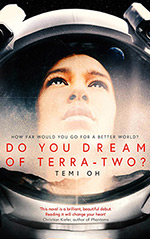
![]() Arifel
Arifel
1/2/2020
![]()
A debut that, despite its flaws, delivers highly accomplished psychological drama on a teen-led mission to a second Earth.
It's the UK, 2012. Summer is coming, the Olympic spirit is setting in, and in London, six teenagers are about to join a 10-person mission to a planet in a nearby system, which humans have discovered is almost a mirror of our own world. The UK Space Agency, which has held its own against the cold war superpowers even as the USA makes it to the moon and the Russians are the first to land on Mars, is eager to be the first onto the planet. The six crew members chosen to start colonising Terra-Two have been training at an intensive space academy for years, and are finally ready to take their place on this twenty-three year mission into the unknown. That is, until things start to unravel on their very last day on earth, throwing the entire mission and the capacity of the crew to undertake it into doubt.
So opens debut YA science fiction novel from Temi Oh, a claustrophobic not-quite-generation-ship story which quickly turns into a psychological meditation on its small cast of characters. The narrative is told from the perspective of each of the kids of the "Beta" crew, including Jesse Solloway, a last-minute replacement selected from their backup team, whose sudden inclusion in the final lineup won't be a surprise to readers given that his point of view is literally in the first section (though I'll leave the exact circumstances of his promotion a mystery). Aside from Jesse, there's also golden-boy alpha male Harry; artistic, passionate Ara; awkward mechanics expert Eliot; underprivileged hyperpolyglot Poppy; and Astrid and Juno, twins with very different outlooks on the mission and their places within it. There's a complement of adults too, who mostly fall along a spectrum of being kind but curmugeonly, but the focus is very much on the youth contingent of the mission and the kids' specific problems - there's definitely a sense that these are young people who haven't quite internalised the fact that the "teachers" have their own lives and struggles, even if they intellectually know about the challenges their seniors must face.
By opening the action around the Terra-Two mission, and the tiny complement of students who get onto it from the academic pressure cooker of Dalton academy, Oh sets up an interesting moment to start the story. By this point, all of the characters have spent years in each others' company to some extent, and while some clearly know each other better than others - there's a notable divide between Jesse and the crew who were originally selected - we are still reading about relationships that have a great deal of baggage behind them, and the whole that's handled quite well. At the same time, setting the action at the start of the crew's 23-year journey makes the distance to the planet insurmountable. I suspect it's no accident that the title frames Terra-two as a "dream": a planet that will somehow provide all the answers to an overcrowded, dying earth, packed with natural beauty and already habitable for humans, somehow becoming more and more unreal with every detail we learn that conforms to the way things are on Earth. The fact that this mission seems so dreamlike, and the protagonists feel so underequipped, may be frustrating for readers seeking a more Seveneves-esque tale of human ingenuity in the face of interstellar adversity, but that's sort of the point: there's a subtle but increasingly clear message that we are supposed to question the design and realism of this mission, even while the teenagers themselves are fixated on their own destinies and, more practically, surviving long enough to arrive with them.
At the heart of Do You Dream of Terra-Two is an interrogation of a point I rarely see made so well: what makes someone gifted, or a leader? All of the teenagers selected for the mission are indisputably talented and driven, and have been placed in a school environment which is clearly intended as its own test of their commitment and capabilities, with very little introspection offered or encouraged about what this pressure actually qualifies them to do. The selection of Harry, the ship's most privileged white male, as not only the pilot-in-training but also future commander (jobs which it is assumed are automatically linked) is the most overt result of that system, but the attempts by Juno, Astrid and even Jesse to articulate their own aspirations for the future, and test the assumption that they are best placed to lead others into it, are equally interesting. At no point does Oh allow us to forget we are watching barely-adults figure themselves out, and much of the tension comes from watching them do so on a spaceship where there is literally no escape from each other or their precarious situation. That it does so - and lets its characters make horrible choices and unforgivable mistakes without ever crossing the line into being unlikeable characters (with one possible exception) - is a testament to how well crafted the psychosocial elements of this text are.
http://www.nerds-feather.com/2019/02/microreview-book-do-you-dream-of-terra.html